- Home
- Megan Mccafferty
Sixteen Page 2
Sixteen Read online
Page 2
He wanted to sleep with me. He hadn’t come out and said it, but he didn’t really have to. He was a senior; we’d been together six months. Us having sex would be a natural progression, after kissing to letting him go up my shirt, then down my pants: Like moving from learner’s permit to license, there’s only one thing left. And so I have this choice. To either merge in or take the long way home.
“I’m so proud of you!”
That was my mother when I came out of the DMV office, holding my new license. It was still warm in my hand from where they’d laminated it, as if it were somehow alive.
“Let me see the picture,” she said. She squinted down at it. “Very nice. You’re not even blinking.”
It was a decent shot. I’d even had a second to brush my hair while the guy was arguing with some woman over her picture—she’d blinked, I guess—which I figured was a bonus. And there, next to my face, was all my pertinent information. Height, weight, eye color. Birthday. And expiration date: 2007. Amazing. Where would I be in four years?
“McDonald’s,” my mother said when I asked her this. We were in the car. I was driving.
“What?” I said.
“I thought we should go to McDonald’s,” she said. She fiddled with her sun visor, up, then down. Although she’d never admit it, my mother was nervous riding with me. “To celebrate.”
“Oh,” I said. “Okay.”
McDonald’s was smack in the middle of the lunch rush, the noise of registers and commotion and the crackling of the drive-through speaker almost overpowering. My mother told me to go find a table, then stood in line clutching her purse. The people behind her were all public-works guys in orange jumpsuits, talking too loudly.
I found a table by the window and sat down. The surface was covered with salt, like a dusting of snow, too thin to see but you could feel it. I moved my finger through it, leaving a circle behind, until suddenly someone put his hands over my eyes.
“Guess who?” a voice said right next to my ear. It was Anthony. Without my sight, the McDonald’s seemed to get quieter, as if you needed to see all the commotion for it to really be happening.
“I know it’s you,” I said softly, reaching up and putting my hands over his. I could feel the silver ring he wore on his index finger pressing gently against my eyelid, cool and smooth. He went to move his hands, the joke being over, but I kept them there for a second longer before he slipped loose and it was bright again.
“So, did you get it?” he asked, dropping one hand onto my neck and leaning over me. I reached into my pocket and pulled out my license, showing him. “Nice. Good picture, too. You’re not even blinking or making a weird face.”
“Nope,” I said. Anthony’s license picture was terrible. Just when the guy was about to pop the flash, someone slammed a door, and Anthony was startled: In the picture he looks surprised, as if his eyes are bugging out of his head. But it doesn’t bother him. He says no one really looks like their license picture, anyway. “I’m lucky, I guess.”
“Yes,” he said, curving his hand around the back of my neck the way that always gave me chills. “You are.”
“Well, hello there!” My mother set the tray down in front of me. Two chicken sandwiches with no mayo, two large fries, two Diet Cokes. We both always get the same thing. “Are you joining us?”
Anthony reached over, took one of my fries, and popped it into his mouth. “Nope,” he said. “Some of us have to get back to school.”
“Poor you,” I said, taking my fries off the tray.
“I’ll call you later,” he said, bending down again and kissing my cheek in a very chaste, big-brother kind of way. Normally I would have at least gotten a kiss on the lips, but my mother was right there. Still, she ducked her head and pretended to be very busy opening ketchup packets until he walked away, waving once over his shoulder. “Get ready for that rotary!” he called out, and then the glass doors swung shut behind him.
My mother picked up her sandwich, adjusting the one piece of lettuce and one tomato: They never give you enough, and the distribution is always all wrong. “You know,” she said finally, taking her first bite, “you don’t have to do the rotary right away.”
“I know,” I said. We’d already discussed this during the weeks I’d had my permit, when she’d officially taught me all of her extended shortcuts. “But I think I should just go ahead and get it over with.”
She took a sip of her drink and glanced out the window. We’d both known this day was coming, eventually. My mother and I were close, always had been. She didn’t fall into any of the specific Mom types: She wasn’t Nagging Mom, or Trying-to-Be-Young-and-Hip-Mom, or Superstrict Mom. My parents were rumpled academics. Books had been their greatest love, before me, and I just knew that when I had flown the nest and was long gone, they’d continue their set patterns, floating from the breakfast nook, which had the best morning light, to the big couch by the fireplace, where they could each take an armrest with their stacks of journals and novels between them. Sentences and paragraphs, themes and symbols—these were things my mother never feared. She had a Ph.D. and did the New York Times crossword every morning before she even had her first cup of coffee. Words didn’t scare her, only shapes. Like circles.
She’d expected me to fall in with this. I knew it by the way she’d easily assumed I’d learn her shortcuts, memorizing them so that I, too, could take a four-mile circuitous route to the post office, which was, measured by the clean numbers of my odometer, a mere half mile away. My father had harrumphed at this, my mother’s lessons in avoidance, and hinted broadly that maybe my induction into the driving public would be a good excuse for my mother to finally face this, the fear of all fears. But I, for one, doubted this would ever happen. My mother had gotten accustomed to taking the long way everywhere: It wasn’t even a burden for her anymore. That’s the thing about habits. And fears. At first they might seem like trouble, but eventually they just fold in, becoming part of the fabric, a jumped stitch you hardly notice except when someone else points it out.
Now, watching her sip her drink, I felt a tug of obligation. She was the lone rotary holdout, and wasn’t it my duty, as her daughter, to stand with her in allegiance? On the other side was not only the rest of our town, but also, more important, my father, fearless warrior of traffic circles, and Anthony, who had crashed his parents’ Volvo once on a rotary one town over and still not thought twice about going back for more. I longed for the simple, solid logic of traffic lights, no decisions necessary: Green means go, red means stop, yellow means slow down or run the light—make up your mind, though, because time’s a-wasting. All straight lines, or variations thereof.
Out in the parking lot, my mother and I buckled up and I backed out slowly, careful of the cars lining up for the drive-through. “Good turning,” she said, praising my slow but effective merging into traffic on the main road. She had her hands in her lap, fingers locked, and we didn’t talk as we moved through three intersections, catching the green light at each. Up ahead I could see the signs for the rotary, warning us of its approach. My mother pulled her fingers tighter, like a Chinese puzzle, and looked out the window quickly, as if the office supply store on her right was suddenly fascinating.
I could do this. It wasn’t any different from all those nights I’d merged and circled the rotary with Anthony or my father: The traffic was just a little heavier. I was not the bravest of girls, but I’d never been branded a coward, either. I told myself I wasn’t just doing this for me, but for my mother as well. I pictured us breezing easily around the curves, the weight of this burden suddenly lifting, my achievement sparking something in her as well, just as my father had hinted. The traffic was picking up now, the last intersection coming up in front of us. The engine seemed to grind as I downshifted, the other drivers pressing in around me.
There was a honk a few cars back—not at us, but loud nonetheless—and I have to admit it threw me, sending a quick hot flush up the back of my neck. It didn’t help, of co
urse, that my mother gasped in a breath loud enough for me to hear over the wind whistling through my not-quite-shut window. And just like that, I lost my confidence, my hand reaching up to hit the right turn signal as if it had made the choice all by itself. As we took the turn onto Murphy’s Chapel Road, my mother let loose of her fingers, pressing them against the fabric of her skirt. Puzzle solved.
“It’s okay,” she said as we breezed past a few neighborhoods, with only two left turns, one access road, and a shopping center parking lot to traverse before arriving home. “You’ll do it when you’re ready.”
She was relieved. I could hear it in her voice, see it in the slow easing of her shoulders back against the headrest. But I was angry with myself for ducking out. It seemed a bad way to begin things, with a false start, a last-minute abort so close to takeoff. As if I’d come this far, right to the brink, and in pulling back set a precedent that would echo, like the sound of my mother’s gasp, next time.
I avoided the rotary for a week and a half. There were several almosts, most of them with Anthony in the car, pep-talking me like a motivational coach.
“Be the road!” he urged me as we coasted up to the ROTARY AHEAD signs. He’d made mix CDs, full of bouncy, you-can-do-anything kinds of songs, which he blasted, thinking they were helping. Instead, they distracted me entirely, as if failing to complete the task meant letting down not only myself and Anthony but also several bands and singers from all over the world. “Visualize it! Breathe through it!”
But always, I took that last possible right turn. The music would play on, unaware of its ineffectiveness, while Anthony would just shake his head, easing an elbow out the window, and say nothing.
His urging was gentler, but no less insistent, when the car was off and we were alone together at the beach. There was music then, too, but it was softer, soothing, as was his voice, in my ear, or against my neck.
“I love you, I love you,” he’d whisper, and I’d feel that same hot flush, traveling up from my feet, the adrenaline rush that was a mix of fear and longing. We’d gotten very close, but again, I pulled back. Scared. It seemed ludicrous that I was unable to follow through with anything, as if from sixteen on I was doomed to be ruled by indecision.
“I just don’t understand why you don’t want to,” he asked me one night as we sat looking at the water, him now leaning against his door, as far away from me as possible, as if the fact that I didn’t want him made it necessary to put the maximum amount of distance between us. There was no gray here, no compromise. We’d come up so quickly on all or nothing that it blindsided me, a mere glint out of the corner of my eye before full impact.
“I want it to be right,” I told him.
“How can this not be right?” He sat up straighter, jutting a finger up at the windshield. “Moonlight? Check. Crashing waves? Check. I love you? Check. You love me? . . .”
It took me a second, just a second, to realize it was my turn to say something.
“Check,” I said quickly, but he glared at me and let his finger drop, as if this explained everything.
As the days passed, and I found myself consistently taking the long way everywhere, I got frustrated with all these decisions. A part of me wanted to barrel into the rotary blindfolded, pushing the gas pedal hard, and let whatever was going to happen just happen, anything for it to be over. The same part sometimes was so close to giving into Anthony’s pleadings, wanting to finally just relax against the seat and let him do what he wanted, let his fingers spread across my skin, trailing downward, just give it all up and finally ease myself of these burdens. Scenario number one, of course, was stupid: I’d cause a multicar pileup and kill myself. As far as number two, well, it was harder to say. What would change? Maybe there wouldn’t be visible damage, dented bumpers or crumpled hoods. But something in me would be different, even if no one else could tell. Like a car that’s been wrecked and fixed, but the frame stays bent, and only the most trained of eyes can feel it pull on curves, or nudge toward the right on straightaways. Just because you don’t see it doesn’t mean something isn’t there. Or gone.
The fall carnival appeared in one afternoon, with rides and a midway and the huge Ferris wheel cropping up in a field by the shopping mall as if dropped from the sky itself. In daylight, as I took my shortcut to school, everything looked tired and rusted, the tarps covering equipment flapping, workers walking around with craggy faces, half asleep. But by that night, with the lights blazing and the sounds of the carnies rounding up business for the games, it was like a whole new world.
Anthony walked in, bought some cotton candy, and proceeded to lose twenty bucks in about five minutes playing a game that involved shooting water pistols at stuffed frogs. I just stood and watched him, silent after my first three tries to point out he was never, ever going to win.
“Tough luck, buddy,” the guy running the game said in a monotone voice, his eyes on the crowd moving past, already looking for the next sucker.
“One more time,” Anthony said, digging out some more bills. “I’m getting closer, I can feel it.”
“How badly do you really need a frog, anyway?” I asked him. They looked like the typical carnival stuffed animals I remembered from my childhood, the kind with nubby fur that smelled faintly like paint stripper. They always looked better before you actually won them, as if the minute the carny handed them over they faded, or diminished somehow, the golden ring gone brass.
“It’s not about the frog,” Anthony snapped at me, bending down to better line up his shot. “It’s about winning.”
“Winning a frog,” I grumbled, but he just ignored me, then slammed his fist down and stalked off when he lost. Again. He cheered up a little bit when I used my money to buy a funnel cake and tickets for the Ferris wheel, then stood in line with me, chewing loudly, the frog forgotten.
Behind us was a guy with his daughter, who looked to be about eight. She had a big stuffed lion under her arm and was gripping her dad’s hand, staring up at the Ferris wheel as it moved lazily above us.
“Now, honey,” the man said, squatting down beside her, “you don’t have to go on it if you don’t want to.”
“I want to,” she said firmly, switching the lion to the other arm.
“Because it might be scary.”
“I want to,” she repeated.
“Okay,” he said, in the kind of voice that was usually accompanied by a shrug. As if he doubted this, her conviction. But as I watched her face, the careful way she studied the ride as it came to a stop, I envied her for knowing exactly what she wanted. But it was easy when you’re little, I figured. Not so many choices.
We got on the ride, and as Anthony pulled the safety bar toward us, I craned my neck around, watching to see if the little girl would get into the next seat. She did, without hesitation, planting her lion next to her and laying her hands in her lap, as if she were only getting on a bus, or sitting in a chair, the world to remain always solid beneath her.
As we started moving, Anthony wrapped both his hands around mine and kissed my neck. I closed my eyes as we moved up, higher and higher, our seat rocking slightly. The Ferris wheel was higher than I’d thought, and as I stared down, everything seemed to shrink to a pinpoint. I could see the steeple from the church on my corner in the distance, beyond that the lights from the football fields. From up high, everything seemed closer together than it actually was, as if the farther away you got, the more the world you knew folded in to comfort itself.
Anthony was sliding his hands onto my stomach, moving one to the small of my back, one beneath my waistband, murmuring in my ear. We were still rising, higher and higher, and someone was screaming a few cars down, but I told myself it wasn’t that little girl, not her. In my mind, I saw her solid face, her absolute determination, and refused to believe it would be so easy to sway her.
We were at the very top when I looked down and felt dizzy. Anthony was pressing against me, his fingers digging, hardly caring that this was not the place, not
the time, so determined was he to win whatever it was he wanted so badly, that seemed so ideal, at least as long as it shrank back from his grasp. All those nights at the beach, when I’d pushed him away, I hadn’t known exactly why, just that it hadn’t felt right. But as my view from high up narrowed, I realized that my relationship with Anthony had done the same, going from a wide endless horizon of possibilities to one pinpoint of a destination. I wanted to have choices, to know that I could, at any moment, still take the long way home. Sure, there was a quick way to anywhere. But sometimes, when you took the shortcut, you missed the view.
“I love you,” he whispered in my ear. “I want you.”
But it wasn’t enough, this time. Maybe later it would have been, but as I pushed him away, I knew that time would never come. Winning might not have been everything, but Anthony was tired of losing at this game. If he couldn’t have me, he’d find an easier prize.
The ride hadn’t even come to a full stop when he pushed the safety bar away from us. It rattled loudly and sent a ripple of force through my metal seat, an echo I felt in my bones. Then he stomped down the stairs to the midway, pushing past all the people lined up for the next ride while I climbed out slowly, taking my time, telling myself to pay attention to how the earth felt beneath me and not take it for granted anymore.
I’d driven, and Anthony was gone, lost in the crowd of sticky wrappers and screaming children and all the voices of the game workers, their coaxing and wheedling like a swarm of bees hovering. When I finally got to my car, it seemed as though everyone was leaving at once, a long snaky trail of brake lights leading out to the main road.
I pulled up behind a pickup truck and then sat there, moving forward in tiny increments, watching the stoplight up ahead drop from red to green, then climb to red again. Even though I’d only been driving for a couple of weeks, it already felt more natural. Things that before I’d had to think about consciously, like switching gears and working the clutch, now happened automatically, as if that part of my mind was handling it, making those decisions for me. Maybe all it took, in the end, was the time to let the new soak in. To stand in the face of change and size it up, acquaint yourself, before jumping in. It was all the pressure that was so hard, those little nudges forward, poke poke poke. If you just backed off and let it come to you, it would.

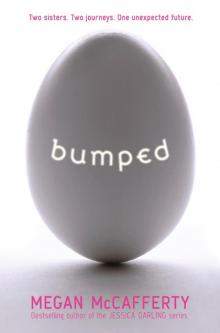 Bumped
Bumped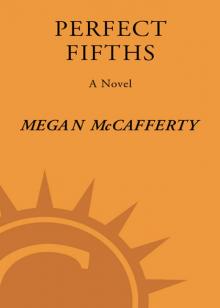 Perfect Fifths
Perfect Fifths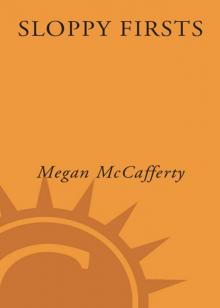 Sloppy Firsts
Sloppy Firsts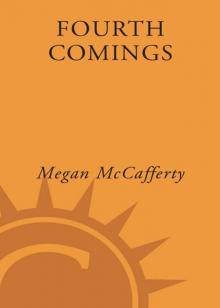 Fourth Comings
Fourth Comings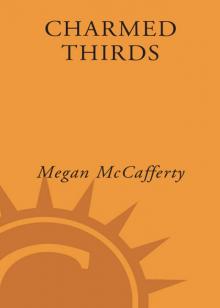 Charmed Thirds
Charmed Thirds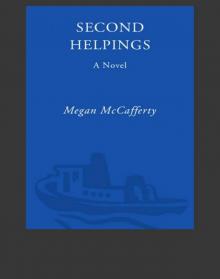 Second Helpings
Second Helpings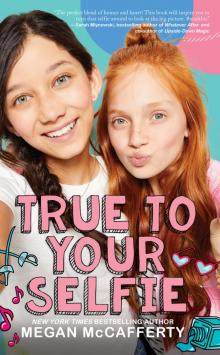 True to Your Selfie
True to Your Selfie Jessica Darling's It List
Jessica Darling's It List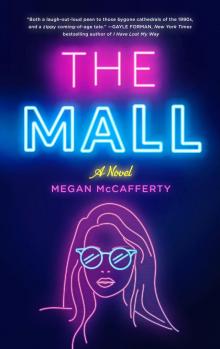 The Mall
The Mall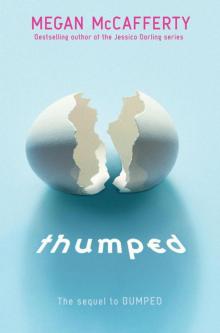 Thumped
Thumped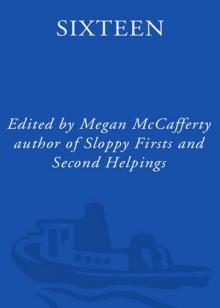 Sixteen
Sixteen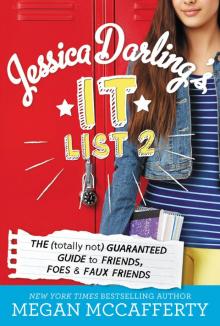 The (Totally Not) Guaranteed Guide to Friends, Foes & Faux Friends
The (Totally Not) Guaranteed Guide to Friends, Foes & Faux Friends The (Totally Not) Guaranteed Guide to Popularity, Prettiness & Perfection
The (Totally Not) Guaranteed Guide to Popularity, Prettiness & Perfection